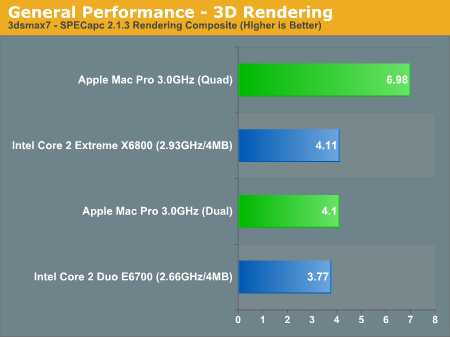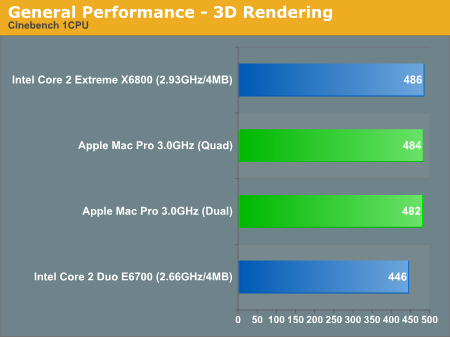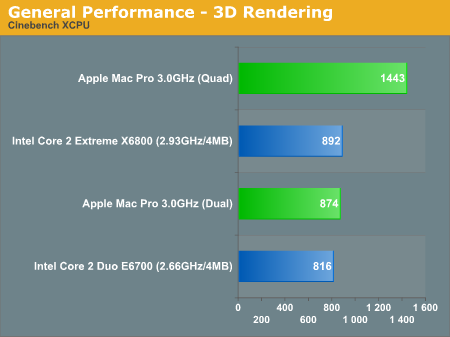Apple's Mac Pro - Upgrading CPUs, Memory & Running XP
by Anand Lal Shimpi on September 12, 2006 1:51 AM EST- Posted in
- Mac
3D Rendering Performance using 3dsmax 7 & CineBench 9.5
We're looking at 3D rendering performance using two different applications: 3D Studio Max and Cinebench 9.5. Cinebench is a free performance testing utility based off of the CINEMA 4D R8 rendering package. Our scores from 3D Studio Max are a composite score from four rendering tests: CBalls2, SinglePipe2, UnderWater, and 3dsmax5 Rays.

Given how much of a boost we saw going from one to two cores in 3dsmax, the incredible performance of the four core Mac Pro 3.0GHz is not surprising. When Intel releases its upcoming Kentsfield processor, you should be able to attain similar performance to the Mac Pro 3.0GHz in a single socket. Naturally, at that point you should also be able to upgrade the Mac Pro to eight cores. Dual socket PC workstations are also be available that compete with the Mac Pro in terms of CPU cores, though without OS X support.

In CineBench's single threaded test, the Mac Pro 3.0GHz and Core 2 Extreme X6800 is virtually identical. The Mac Pro should be a bit faster thanks to its faster FSB and slightly higher clock speed, but the use of FB-DIMMs results in a bit of a performance penalty that ends up evening out the performance.

The multithreaded CineBench test shows us similar scaling to what we saw in 3dsmax; the move to four cores gives the Mac Pro a 65% boost in performance.










72 Comments
View All Comments
bobsmith1492 - Tuesday, September 12, 2006 - link
Well, thank you for the enlightenment. I will never use Vista now that I know I cannot use more than 64GB of RAM.blwest - Tuesday, September 12, 2006 - link
Who did that comment come from, something about never needing more than 64K? Was it Bill Gates?I already have customers that use Linux over MS because they utilize 64GB of ram TODAY. Even when Vista is released, they will still be using Linux.
bobsmith1492 - Tuesday, September 12, 2006 - link
Well, I've doubled the amount of ram in my _personal_ computer twice in about 5 years along with one upgrade of Windows (98-XP)... so, in 5 more, I'll have 8GB, 10 more: 32, and in about 12.5 years, I'll be up to 64GB, by extrapolation. :P Anyway, I don't expect Vista to last that long, so I guess I'm ok (heck, I'll use XP for a few more years anyway, no doubt - XP was out for a few years before I upgraded).As far as the 64GB of RAM, if you need that for your application, you probably wouldn't even dream of using a closed-source OS for it anyway, so I think the RAM limitation isn't really that relevant (maybe for servers...)
greylica - Tuesday, September 12, 2006 - link
Course the common user will not have to use that quantity of Ram, as far as I know, they are still using 256MB at nmaximun in order to run only apps for office/small production.Here in Brazil the most of them are using at maximun 512 MB of Ram, but when we think in a machine different, like a MAc, or then a graphic Workstation, or then an data seismic or a test evaluation machine, 64 GB in 5 years will be a cap, a limit.
Anyway Linux can save our souls to this switch Microsoft is trying to do again, and again...
A simpler crowd simulation in XSI can achieve 16 GB of Ram in a workstation...
Vista Premium can accept more than 4GB, course, but in the 32 bit usage, the same old 3GB switch is aplicable, but I don´t even imagine why they at the same tima reserve 4GB for the kernel, and limit Vista to 1/2 of the potential.
It´s a same old problem coming back again.
Even 2000 accepts PAE, but doesn´t serve for nothing, course they can give a patch, but, do they want ???
If a patch for ths issue is released, this topic can be sent to oblivion.
Microsoft, give us a patch to 3GB switch right now !!!!!!
mostlyprudent - Tuesday, September 12, 2006 - link
I have to agree with the first part of your post. I read the article and thought.."Why?". I have always understood the appeal of a Mac to be that you could upack it and get to work. If we start talking about running other OSs on a Mac or hacking software/drivers for better hardware supprt, then why pay the premium for a Mac?lopri - Tuesday, September 12, 2006 - link
Well, sort of.. Remember that now Mac is a PC with the ability to dual-boot between XP and OS X. Other than the anatomy description for CPU upgrading, I don't see anything Mac-specific about this article. You can replace the tested Mac with an equivalent workstation from Dell, HP, etc. and the end result would be the same. It's also very questionable how much appeal this article would have to an 'average' apple user - who wants a computer that just works, without worrying about upgrading or fixing, and prefers to use for creative works or entertainment. (This isn't my opinion, btw. I happened to read a few articles on Apple/Mac @DailyTech, and it's how Mac users described themselves) I totally understand this article is a sequel/finale to a previous article, but I think some people would agree with me. (If not, oh well.. :) )From this viewpoint, I'd like to make a comment that Anand's obsession on Apple (be it hardware or software) has been quite over-the-top already. Even though this article isn't really about something unique to Apple, he doesn't skip a single product that Apple produces. (I still can't believe he "reviewed" a mouse just because it's from Apple. There are many more superior and innovative mice in the market, you know.)
Whether it's his personal preference towards Mac/OS X or a business strategy to expand the readership of this site isn't clear to me. But I can't help but notice the imbalance and ask why.
Anand Lal Shimpi - Tuesday, September 12, 2006 - link
The point of the article was for users that want to run OS X as well as Windows XP, rounding out the performance comparison by showing what sort of XP performance you can expect out of the Mac Pro.As for our Mac coverage, we definitely don't review every Apple product that comes out, but the ones that we do focus on are those that are most interesting to the community. The vast majority of our content is still PC focused, but whenever there's a big Apple release we will do our best to cover it just as we do major releases on the PC side.
Take care,
Anand
JAS - Thursday, September 14, 2006 - link
PC = Personal Computer, regardless of whether it is running OS X or Microsoft Windows.Please continue with the Macintosh coverage, Anand. I appreciate the excellent work that you do, and even bought a Mac because of one of your reviews. What a fabulous computer.
Calin - Tuesday, September 12, 2006 - link
:)I'm sure Anand wants to expand the readership of his site to the 5% Mac users :)
(no offence, Anand) but I think this was more like a toy, that is getting better and better. "I bet I could use only this Mac for everything" could have been the idea of the first article, and in the end it seems the Macs were even better than that (whether by look and feel, ergonomy in user interface, invulnerability to almost all viruses/worms/... (the first Mac used by Anand was Power based), other reasons or a combination of all the above).
On another note, I wonder how well those new Macs will survive in the virus world, now that they now have the x86 processors
JAS - Thursday, September 14, 2006 - link
If you mean running Microsoft Windows on a Macintosh, then it is as susceptible to spyware and viruses as any other MS Windows computer. These problems are tied to the operating system, not the microprocessor. OS X is as secure running on Intel as it is on PowerPC chips.